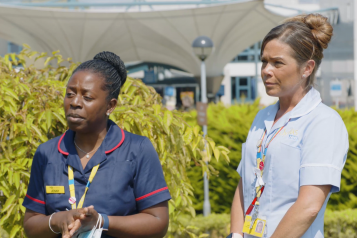Cost of living - a barrier to healthcare for the most vulnerable

The cost of living is having a detrimental impact on people's decisions about their healthcare. But if you are disabled, on means-tested benefits or aged 18-24, you're more likely to avoid vital health services due to the fear of extra costs. We set out immediate actions for the government and the NHS.
Over the last year, many charities and campaign groups have warned that millions of people are struggling with the cost-of-living crisis.
We have heard from our Healthwatch network about the impact the rising cost of living is having on people.
To understand the scale and nature of this impact, especially on people’s health and their use of health and care services, we commissioned a nationally representative (of England) poll.
We reported findings from waves 1 and 2 earlier this year.
Key trends in our research
Our poll of 2000 adults in England, conducted four times between October 2022 and March 2023, suggests that people are increasingly avoiding vital health and care services due to the fear of extra costs:
- going to a dentist because of the cost of checks ups or treatment
- booking an NHS appointment because they couldn’t afford the associated costs, such as accessing the Internet or the cost of a phone call
- buying over the counter medication they normally rely on
- taking up one or more NHS prescriptions because of the cost.
“I can't get a GP appointment. The highest I have ever got in the telephone queue is number 11, and so I gave up in the end as it was costing me a lot of money on my telephone bill and I am a pensioner. All I want is a referral to an audiologist as I am losing my hearing.” - Sandra, Wolverhampton
Rising costs further exacerbate health inequalities
Our research also highlighted that the financial burden of healthcare is weighing heavily on specific groups:
- people on disability benefits
- people on means-tested benefits
- and younger people, aged 18-24.
We’ve found that people from these groups are more likely to be making tough decisions to avoid essential services. Examples include:
- People on disability benefits are over twice as likely to have avoided their usual over-the-counter medication than the general public, 15% compared to seven per cent.
- One in five, 20%, of people on means-tested benefits have avoided booking an NHS appointment due to the associated costs, including the internet or phone call, compared to six per cent of the general public.
- People aged 18 to 24 are twice as likely to have avoided an NHS appointment due to travel costs compared to the general public, 14% to six per cent.
- On average, one in five people from each group avoided the dentist because of the related costs.
The cost of living should never be a barrier to care
As a patient champion, we are worried that vital health and care services are out of reach for many people.
We know that people living with ill health and disability are already much more likely than others to be pulled into poverty because of spiralling costs. Making decisions between eating, medications and keeping medical devices running, can further impact their physical and mental health, putting them in danger.
The cost of living should never be a barrier to healthcare. Yet, it has become so, further exacerbating inequalities laid bare by the Covid-19 pandemic, and raising the question as to whether the NHS can genuinely provide high-quality care, free at the point of need on an equal footing for everyone.
We fully believe that with the right changes, the NHS can continue to do so.
“I've had to have lots of hospital visits lately because of being diagnosed with lukeamia. I eventually decided to ask for help with petrol costs as I am on benefits. Its 20 miles to hospital and 20 back. I was given £4.60!! For 40 miles! In about 2 months I had about 10 appointments and had to pay a lot more than this in petrol money.” Gill, Norfolk.
Our recommendations
While we welcome the support already in place, social tariffs and schemes must be better communicated to the people who need it.
This includes ensuring that:
- Communication providers communicate about and signpost to social tariffs
- Primary care teams make people who need medication aware of pre-payment options
- Dentistry teams offer check-ups based on individual need, to free up more NHS slots
- More people are aware of the Healthcare Travel Cost Scheme (HTCS).
The government working with health and care services must also go further to support people in the cost-of-living crisis.
Tangible actions
At Healthwatch England, we set out immediate tangible actions:
Prescriptions
Guidance should encourage GPs to offer people over-the-counter medications on prescription based on socioeconomic grounds.
Travel
NHS England should re-open its review of the HTCS, and introduce reimbursement for journeys to people’s GP, dentist and pharmacy teams.
NHS freephone
NHS England should work with Ofcom and telecommunications companies to ensure that hospital and GP phone numbers are part of the freephone service, so cost is never a barrier to phoning a health service.
Benefits system
Government should ensure benefits, including Statutory Sick Pay (SSP), keep pace with inflation in real terms.
Government should also extend the amount of time SSP can be paid to people who can no longer work due to long waits for NHS treatment. One in ten people wait over four months for a GP referral, and 92% of people on waiting lists are currently waiting up to 46 weeks for a hospital appointment. This means that the current 28-week access cannot support those who need it.
Broadband
Health leaders and regulators should look at what more can be done to ensure telecommunications providers introduce and raise awareness of social tariffs to eligible households, as the uptake of this support remains low.
Recent research by Citizens Advice suggests that up to one million people have cancelled their broadband in the last year because they couldn't afford it.
As we increasingly move to more remote ways of communicating, tracking, managing and attending NHS appointments, we must ensure that everyone can access the support they need.
Download our data
These online surveys of adults in England (nationally representative) were commissioned by Healthwatch England and conducted by market research company OnePoll, in accordance with the Market Research Society's code of conduct. Data was collected four times between October 2022 and March 2023. All participants are opted in to take part in research and are paid an amount depending on the length and complexity of the survey. This survey was overseen and edited by the OnePoll research team, who are members of the MRS and have corporate membership to ESOMAR.


